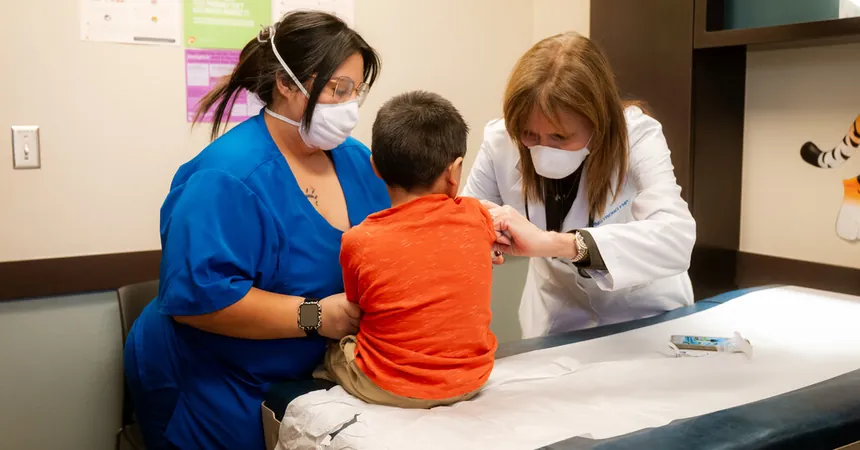
Measles Outbreak in Texas: Risks of Vitamin A Supplementation from Anti-Vaccine Advocates
2025-03-25
Author: Jessica Wong
Introduction
In West Texas, a troubling trend is emerging among families grappling with a significant measles outbreak. Many parents are turning to alternative therapies, notably vitamin A supplementation, promoted by vaccine skeptics including Robert F. Kennedy Jr. Unfortunately, this shift is leaving some children more ill than they were initially.
Current Situation
Gaines County is at the center of this outbreak, which has reportedly infected over 320 individuals since it began in January. As health officials scramble to contain the virus, many unvaccinated children are being subjected to the effects of high doses of cod liver oil and other vitamin A products recommended by advocates like Kennedy, who claims they have miraculous healing abilities.
Health Concerns
Dr. Summer Davies, a children's health specialist at Covenant Children’s Hospital in Lubbock, has been alarmed by the disturbing number of unvaccinated children showing signs of liver damage, more often than not attributed to the excessive consumption of vitamin A. She recounted a case where a child took these supplements for weeks despite only suffering mild illness from measles, leading to complications that were later uncovered in routine liver function tests.
Medical Guidance
While medical authorities recognize that high doses of vitamin A can be beneficial in a hospital setting for managing severe measles cases, they caution against unsupervised use. Proper medical guidance is critical, as the vitamin does not prevent measles but is rather administered to aid recovery in extreme cases. In contrast, the conventional two-dose measles, mumps, and rubella (MMR) vaccine boasts an efficacy rate of 97% against measles.
Risks of Excessive Vitamin A
Unmonitored doses of vitamin A can lead to a multitude of health issues, including liver damage, skin problems, and in severe instances, seizures and coma. In recent weeks, West Texas hospitals have identified several patients showing signs of liver distress—symptoms that arose from excessive vitamin A intake.
Regional Impact
The outbreak's spread is not limited to Texas, as neighboring New Mexico has documented 43 infected individuals, with two requiring hospitalization. Oklahoma has also reported seven linked cases, raising concerns about the scope of the vaccination crisis in the region.
The Role of Community Traditions
Local health officials are increasingly alarmed by the inclination towards unverified treatments, which they fear could delay necessary medical care and further discourage families from vaccinating their children—the most proven method of preventing measles. Unquestionably, the highly traditional Mennonite community in Gaines County has been a significant contributing factor to the outbreak, as many residents tend to shun conventional medical practices in favor of longstanding natural remedy traditions.
Promotion of Vitamin A
Kennedy's promotion of vitamin A as a measles remedy appears to have gained traction after a Fox News interview where he suggested the oil provided "almost miraculous and instantaneous recovery". Following this broadcast, pharmacy shelves struggled to keep cod liver oil and vitamin A products in stock, indicating a surge in demand tied to his statements. Local health officials, including Lubbock's public health director, echoed this sentiment, noting a dramatic increase in interest in vitamin A supplementation for measles.
Expert Opinions
Experts are quick to advise that while vitamin A supplementation can play a supportive role for children diagnosed with measles—given under strict medical supervision—it is not an alternative to vaccination. There is no credible evidence that high doses of vitamin A can prevent measles, especially in environments like the U.S., where vitamin A deficiency is extremely rare.
Conclusion
In the face of this outbreak, health officials reiterate the vital importance of getting vaccinated as a primary defense against measles and other contagious diseases, urging communities to prioritize evidence-based medical treatments over unproven alternatives.


 Brasil (PT)
Brasil (PT)
 Canada (EN)
Canada (EN)
 Chile (ES)
Chile (ES)
 Česko (CS)
Česko (CS)
 대한민국 (KO)
대한민국 (KO)
 España (ES)
España (ES)
 France (FR)
France (FR)
 Hong Kong (EN)
Hong Kong (EN)
 Italia (IT)
Italia (IT)
 日本 (JA)
日本 (JA)
 Magyarország (HU)
Magyarország (HU)
 Norge (NO)
Norge (NO)
 Polska (PL)
Polska (PL)
 Schweiz (DE)
Schweiz (DE)
 Singapore (EN)
Singapore (EN)
 Sverige (SV)
Sverige (SV)
 Suomi (FI)
Suomi (FI)
 Türkiye (TR)
Türkiye (TR)
 الإمارات العربية المتحدة (AR)
الإمارات العربية المتحدة (AR)